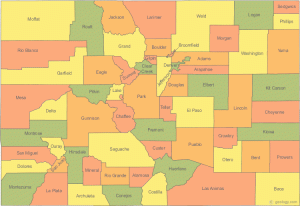Colorado State Tax
Colorado Tax
Colorado Income Tax
 The Colorado state tax code requires qualified individuals to file both federal income tax and state income tax returns yearly. The State of Colorado also levies sales tax and property tax. Estates of owners who died on or after January 1, 2005 are exempt from inheritance and estate taxes.
The Colorado state tax code requires qualified individuals to file both federal income tax and state income tax returns yearly. The State of Colorado also levies sales tax and property tax. Estates of owners who died on or after January 1, 2005 are exempt from inheritance and estate taxes.
Colorado state tax code requires full-time and part-time residents to file their tax returns for earnings made during their stay in the state. Non-residents are also required to file their tax return for incomes earned from a Colorado-based source. There are no minimum income requirements for filing.
The individual state income tax rate in Colorado is 4.63% of the federal taxable income, regardless of the amount of income filed by the taxpayer. However, the computations can be adjusted and lowered if the individual is qualified for reductions such as childcare tax credit, alternative vehicle credit, and pension income exemption.
The State of Colorado levies property tax on personal assets as well as business furniture and equipment used to generate income. However, the state tax code does not levy tax on intangible resources such as stocks and bonds. Property tax is calculated based on the assessed value of the property multiplied by the local property tax rate.
Sales tax is another main source of state tax revenue in Colorado. Colorado sales tax rate is fixed at 2.9%. However, certain locations may require additional county and city sales tax. There are also special taxing districts levy special taxes to fund special projects. Sales tax payments are required from individual or businesses that sell, rent, or lease tangible goods.

